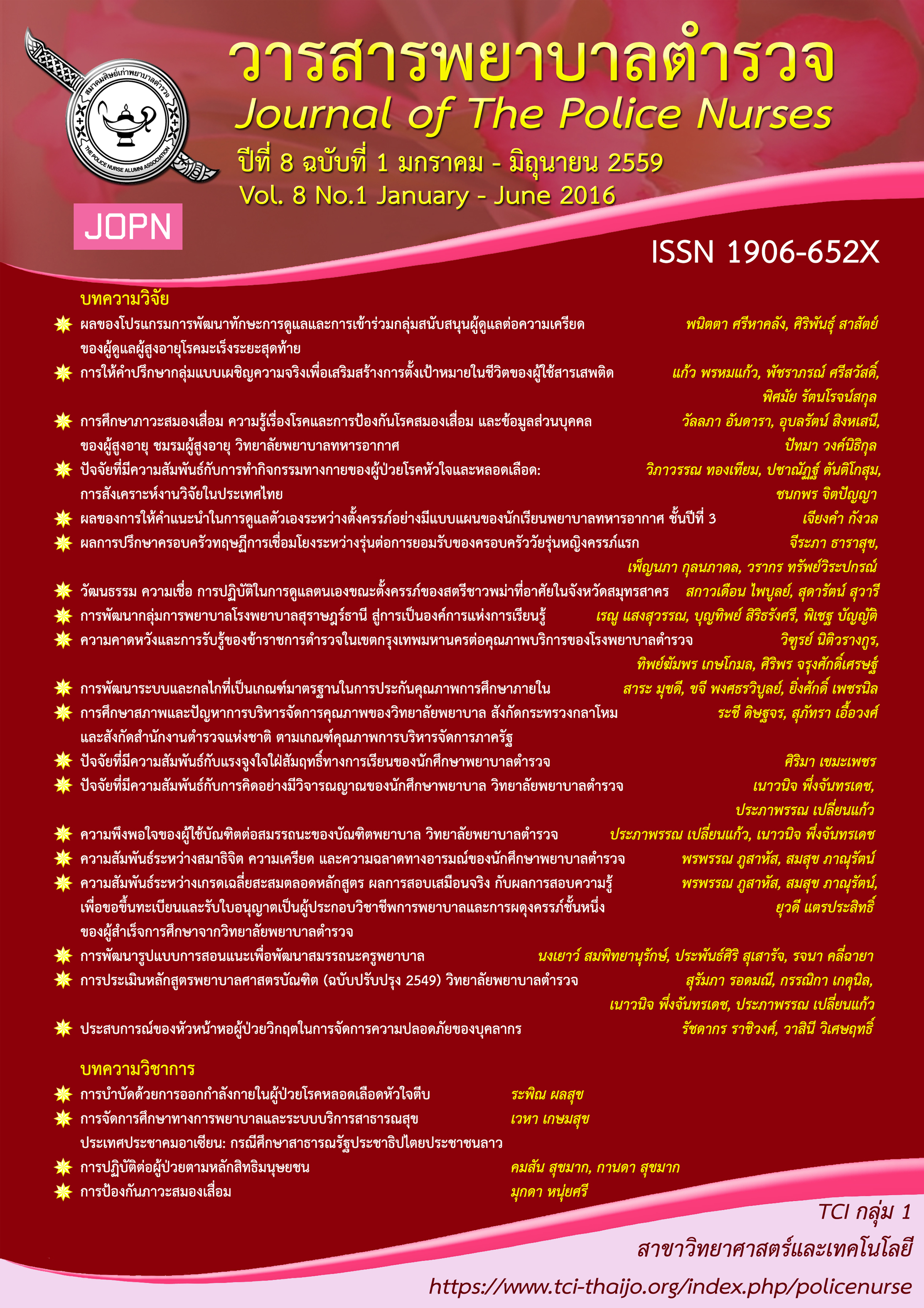การจัดการศึกษาทางการพยาบาลและระบบบริการสาธารณสุขประเทศประชาคมอาเซียน: กรณีศึกษาสาธารณรัฐประชาธิปไตยประชาชนลาว
Keywords:
ประชาคมอาเซียน, ระบบบริการสาธารณสุข, การศึกษาพยาบาล, ประเทศลาว, ASEAN Community, health care system, nursing education, LaoAbstract
การรวมตัวของกลุ่มประเทศสมาชิกอาเซียนให้เป็นชุมชนที่มีความเข้มแข็ง สามารถสร้างโอกาสและรับมือกับสิ่งที่ท้าท้ายทั้งด้านเศรษฐกิจ การเมือง ความมั่นคง และภัยคุกคามทุกรูปแบบ แต่สิ่งที่ประเทศสมาชิกต้องเผชิญคือ สิ่งท้าทายและสภาพปัญหาใหม่ ๆ อาทิ โรคระบาด การก่อการร้าย ยาเสพติด การค้ามนุษย์ สิ่งแวดล้อม ภัยพิบัติ การเคลื่อนย้ายแรงงานฝีมืออย่างเสรี 8 อาชีพหลักโดยเฉพาะวิชาชีพการพยาบาล ส่งผลให้หน่วยงานที่เกี่ยวข้องกับการดูแลมาตรฐานของวิชาชีพต้องดำเนินการอย่างเข้มแข็งรัดกุม เพื่อรักษามาตรฐานของผู้สำเร็จคงเดิมหรือยกระดับให้สูงขึ้นไม่ให้ต่ำกว่ามาตรฐาน การเข้าใจระบบบริการสาธารณสุขและการจัดการศึกษาด้านวิชาชีพสุขภาพโดยเฉพาะวิชาชีพการพยาบาลในประเทศประชาคมอาเซียนจึงมีความสำคัญที่จะทำให้เข้าใจบริบทชุมชน และเป็นข้อมูลเบื้องต้น เพื่อเตรียมการในการไปปฏิบัติงาน การพัฒนาคุณภาพบริการ ระบบบริการและการผลิตกำลังคนด้านสุขภาพ จากกรณีศึกษาวิชาชีพการพยาบาลและระบบบริการสาธารณสุขประเทศสาธารณรัฐประชาธิปไตยประชาชนลาวมีระบบการเรียนการสอนที่ทำให้เกิดผลสัมฤทธิ์โดยใช้รูปแบบการเรียนการสอนแบบชิปู (CHIPU) และลักษณะการจัดการเรียนการสอนที่เป็นสหสาขาวิชาชีพ (interprofessional education) เพื่อให้บัณฑิตที่สำเร็จการศึกษามีความรู้ ทักษะ และความสามารถที่เหมาะสมสอดคล้องกับสภาพความต้องการในระบบสาธารณสุขของชุมชนและประชาชน มุ่งเน้นระบบการเรียนการสอนแบบเรียนรู้ร่วมกันทั้งในวิชาชีพ ระหว่างวิชาชีพ ที่มีการบูรณาการศาสตร์ และศิลป์เพื่อให้พร้อมแก้ไขปัญหาและก้าวทันการเปลี่ยนแปลงของโลก
NURSING EDUCATION AND HEALTH CARE SYSTEM IN ASEAN COMMUNITY: CASE STUDY IN LAO PEOPLE’S DEMOCRETIC REPUBLIC
Abstract
The aggregation of ASEAN as a strengthened community creates opportunities and competencies for coping with the challenge of economic, political and national security as well as all threats. But the countries are facing in challenging and new problems, such as epidemics, terrorism, drug trafficking, environmental disasters, free flow of services and moving freely eight major professional workers, particularly in nursing. It results to the organizations involved in the care and standards of professional must be precisely controlled in order to maintain the standard or higher, not lower the exist standards. To understand the public health care services system and the education of health professionals, particularly nursing education in ASEAN is important to understand the community context as the preliminary data for the preparation of the operation. Quality of service improvement, service system and health workforce; a case study of the nursing education and the health service in Lao; they have a system of instruction that results in the way of its achievement by using a CHIPU teaching style and provide the teaching and learning by multidisciplinary teams (inter professional education) in order to produce the graduates who fulfill with the knowledge, skills and capacity to comply the health system, communities and resident needs. The teaching and learning system focuses on learning together within the profession and among other careers with the integration of science and art technique, problem solving and keep pace towards change in the world.
Downloads
Downloads
Published
How to Cite
Issue
Section
License
ผลงานที่ได้ตีพิมพ์แล้วจะเป็นลิขสิทธิ์ของวารสารพยาบาลตำรวจ















